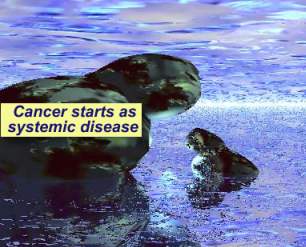
 |
Now that NCI admits its defeat let us remember its soothing declarations on advances that by the end of this century should reduce cancer mortality by 50%. This was challenged by John Bailar III, a former NCI biostatistitian in an article that appeared in the New England Journal of medicine (2,3) to which NCI retorted that he was utterly wrong. Unfortunately he was right, in spite of this, another "cancer warrior", Sir Richard Doll, continues declaring that "the war against cancer is being won" (4).
These highlight a disturbing aspect of modern medical research. Leading experts and institutions spread disinformation (5). Instead of admitting that the current dogma of cancer failed and ought to be reformulated, they claim that "we have done well in developing a basic understanding of biological processes of cancer". What do these gentlemen mean by "basic understanding" if they cannot cure the disease? (6).
Failure to cure cancer should be regarded first of all as a failure of medical reasoning which is most pronounced in cancer and affects also treatment of other diseases. It originates in the false belief that technology will ultimately cure anything. The National Cancer Act was designed like project Apollo. It promised to conquer cancer in the same way as one conquers a new continent. And when one wages a war, anything is justified, even aggressive poisoning with chemotherapy,
Oncology regards cancer as a parasite originating in a chance event transforming a healthy cell into a fierce crab, proliferating without restraint until the ultimate destruction of its host. In order to cure the patient the crab should be removed as soon as possible. Yet in spite of this most patients cannot be cured. It is assumed that when the patient seeks help the tumor had spread all over the body and he cannot benefit from local treatment. But what if cancer is essentially a systemic disease? (7). Take for instance arteriosclerosis that is manifested by local phenomena, e.g., stroke and myocardial infarction, and yet is essentially systemic. The same could apply to cancer, which like arteriosclerosis is "metabolically" systemic, and presents itself also by local phenomena, e.g., neoplasia. In the same way as treatment of an ailing heart does not cure the underlying arteriosclerosis, why should neoplastic ablation cure cancer?
References
1 Marshall E. Breast cancer: stalemate in the war on cancer. Science 254, 1719-1720, 1991.
2 Zajicek G. Progress against cancer: are we winning the war ? The Cancer J. 3,2,1990.
3 Bailar SJ, Smith EM. Progress against cancer. New Engl. J. Med. 314,1226-1239,1986.
4 Sir Richard Doll. Progress against cancer: are we winning the war? Acta Oncol. 28,611-621,1989.
5 Zajicek G. Cancer wars. The Cancer J. 4,4,1991.
6 Zajicek G. What would you do if this were your... wife, sister, mother self? The Cancer J. 4,2,76,1991.
7 Zajicek G. Hypothesis: cancer is a metabolic deficiency. The Cancer J. 4,356,1992.